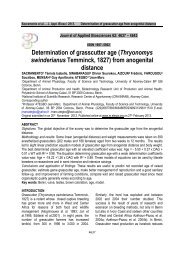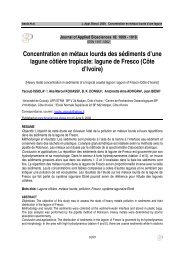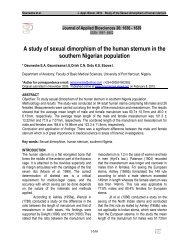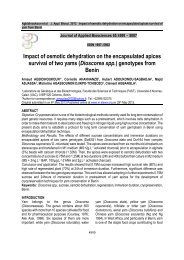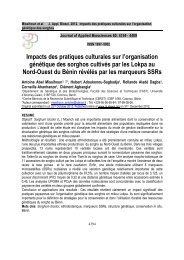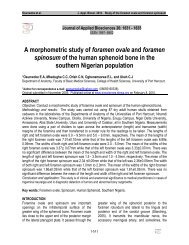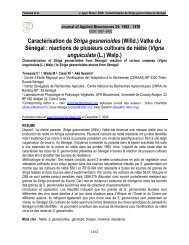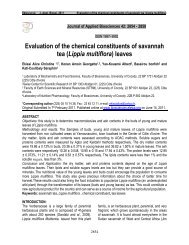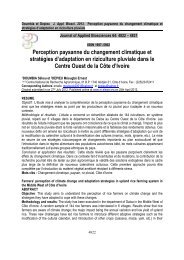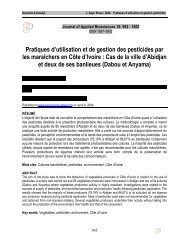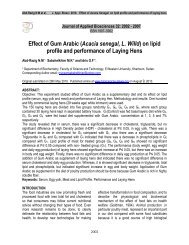Biofuels in Tanzania: Status, Opportunities and Challenges
Biofuels in Tanzania: Status, Opportunities and Challenges
Biofuels in Tanzania: Status, Opportunities and Challenges
Create successful ePaper yourself
Turn your PDF publications into a flip-book with our unique Google optimized e-Paper software.
Anthony M. Msh<strong>and</strong>ete.J. Appl. Biosci. 2011. <strong>Biofuels</strong> <strong>in</strong> <strong>Tanzania</strong>: <strong>Status</strong>, <strong>Opportunities</strong> <strong>and</strong> challengesImpact of biofuels on food securityThe competition between food <strong>and</strong> energy crops hasbecome an <strong>in</strong>ternational debate. Prices <strong>in</strong>creases forsome biofuel crops that are also staple foods placefood security at risk by rais<strong>in</strong>g prices <strong>and</strong> <strong>in</strong>creas<strong>in</strong>grather than decreas<strong>in</strong>g poverty. This is likely to happenif it is more profitable to sell food crops to biofuelsproducers (WWF-<strong>Tanzania</strong>, 2009). The assessment ofimpacts of food security from biofuel developments isnormally based on basic production models namely;plantation/estate, out grower <strong>and</strong> hybrid. Whereas outgrower models are seen as more supportive of foodsecurity, despite substitution of l<strong>and</strong> <strong>and</strong> labor toproduction exported from the micro-level system,<strong>in</strong>tegration of cash <strong>and</strong> food crops provides benefit of<strong>in</strong>tensification <strong>and</strong> diversification of cultivation, reduc<strong>in</strong>grisks from pests <strong>and</strong> diseases to which mono-croppedsystems are more susceptible. Reduced risk may meanthat the farmer could potentially make more cash, thusimprov<strong>in</strong>g her/his risk to food security (RSB-GUI, 2009).Food security is improved when the ma<strong>in</strong> food crop <strong>and</strong>cropl<strong>and</strong> are not diverted to biofuel production, as is thecase with bioethanol or biodiesel. The food <strong>and</strong>livelihood security of farmers displaced by biofuelplantations will be affected, while those encouraged togrow feedstock on their own l<strong>and</strong> <strong>in</strong>stead of food crops,may be at greater risk of food <strong>in</strong>security (Scott, 2009).The potential impact of biofuel production on the priceof food crops, <strong>in</strong> <strong>Tanzania</strong> <strong>and</strong> around the world, hasbeen raised as a major issue of concern on the part ofcivil society organizations, government policy-makers,foreign donors, local communities, <strong>and</strong> <strong>in</strong> some casesthe <strong>in</strong>vestors themselves (Sulle & Nelson, 2009a).Cultivation of energy plants, which goes h<strong>and</strong>-<strong>in</strong>-h<strong>and</strong>with forced resettlement, have recently been reportedthat could most likely affect food prices <strong>in</strong> <strong>Tanzania</strong> <strong>and</strong>compound even more the country's dependency onfood imports (Kamanga, 2008). Also, at household level<strong>in</strong> <strong>Tanzania</strong> it had been reported that there is evidencethat food prices <strong>in</strong> local markets are beg<strong>in</strong>n<strong>in</strong>g to<strong>in</strong>crease because of the <strong>in</strong>dustrial biofuel companies <strong>in</strong>their locality (Action Aid, 2010). Beside the empiricalevidence from a number of sub-Saharan countries<strong>in</strong>clud<strong>in</strong>g <strong>Tanzania</strong> show that the majority of farmers orrural households are not net food sellers but are netbuyers of food <strong>and</strong> consequently they are the mostvulnerable to rises <strong>in</strong> food prices (Action Aid, 2010).Increas<strong>in</strong>g pressures on <strong>in</strong>vestors to scout for cultivablel<strong>and</strong> had <strong>in</strong>flamed the food versus biofuel debate <strong>and</strong>spurred major controversies over the large-scale biofuelplantations <strong>in</strong> relation to food security <strong>in</strong> <strong>Tanzania</strong>.Therefore, the danger that <strong>Tanzania</strong> might soon beoverrun by such biofuel crops <strong>in</strong>vestments is threat toits already precarious food security situation (Redfern,2008). Scientific evidence is steadily mov<strong>in</strong>g aga<strong>in</strong>st<strong>in</strong>dustrial biofuels (first generation biofuels) <strong>and</strong> the l<strong>in</strong>kbetween biofuels <strong>and</strong> food <strong>in</strong>security is strong. There isa connection between the two, particularly from awomen’s rights perspective, <strong>and</strong> the extent to which theright to food is be<strong>in</strong>g underm<strong>in</strong>ed by <strong>in</strong>dustrial biofuels(Action Aid, 2010). In fact <strong>in</strong> develop<strong>in</strong>g countries, ruralwomen produce 60-80% of the food. For example <strong>in</strong>Sub-Saharan Africa countries such as <strong>Tanzania</strong> womenproduce about 80% of household food (UN MillenniumProject, 2005). In regard to water supply <strong>and</strong> quality ithas been reported that many feedstock – <strong>in</strong>clud<strong>in</strong>gsugar, palm oil <strong>and</strong> maize–are highly water <strong>in</strong>tensive,mean<strong>in</strong>g that their expansion is likely to make waterless readily available for household use, threaten<strong>in</strong>g thehealth status <strong>and</strong> food security status of affected<strong>in</strong>dividuals (FAO, 2008a). Fear of food shortages <strong>and</strong>mount<strong>in</strong>g pressure from environmentalists, farmers,NGO’s have prompted the <strong>Tanzania</strong>n government tosuspend the allocation of arable l<strong>and</strong>, process<strong>in</strong>g anynew applications for biofuel projects <strong>and</strong> eviction offarmers over biofuel projects, pend<strong>in</strong>g ratification of alaw <strong>and</strong> establishment of a regulatory mechanism togovern the sector <strong>and</strong> monitor the biofuel <strong>in</strong>dustry.It should however be acknowledged strongly thatresearch suggest that the relationship between biofuel<strong>and</strong> food is very complicated (Kaye-Blake, 2010). Table6 summarizes the relation ship between biofuel <strong>and</strong>food <strong>in</strong> <strong>Tanzania</strong>n context <strong>and</strong> elsewhere applicable.Table 6: Complexity of the relationship between biofuel <strong>and</strong> foodIssueExplanationPopulationGrow<strong>in</strong>g population <strong>and</strong> improved diets are plac<strong>in</strong>g ever-greater dem<strong>and</strong>s on l<strong>and</strong> for food production.So that competition <strong>and</strong> conflict with biofuel production us<strong>in</strong>g current methods will ever <strong>in</strong>crease thedem<strong>and</strong> for food where <strong>in</strong> a world about one billion people are already hungry/underfed (FAO, 2008a).What does it mean for a future with even less biofuel <strong>and</strong> more people?KnowledgeWith more knowledge, better management <strong>and</strong> <strong>in</strong>creased capital, the same, f<strong>in</strong>ite amount of l<strong>and</strong> canproduce more food <strong>and</strong> fuel. The greater production does not require more l<strong>and</strong> <strong>and</strong> does not2690



